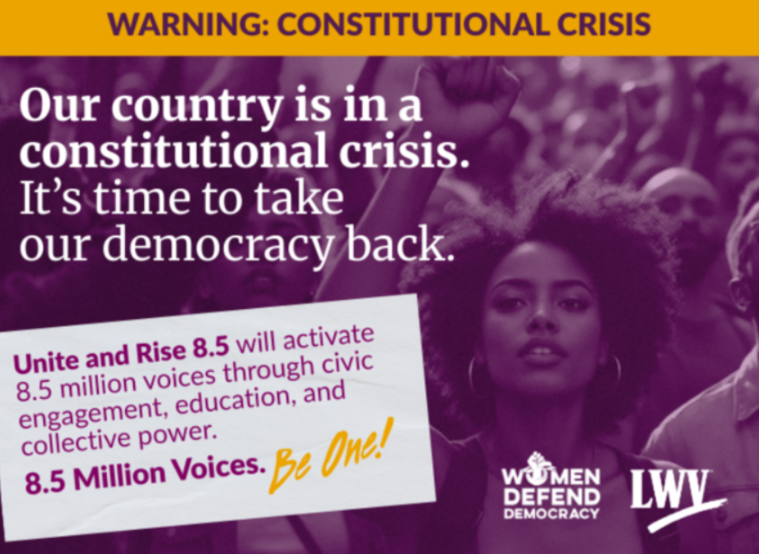Our Mission: Creating a More Perfect Democracy
The League of Women Voters, a nonpartisan political organization, encourages the informed and active participation of citizens in government, works to increase understanding of major public policy issues, and influences public policy through education and advocacy. As a nonpartisan body, the League takes action on issues but does not support or oppose candidates or parties. The League supports diversity, equity and inclusion in membership and programming.
We register voters and defend all citizens' voting rights. We monitor government activities from city councils and school boards to state legislatures and the U.S. Congress. We educate citizens about their rights and responsibilities. We sponsor candidate forums and public issues forums. We study issues in order to arrive at member consensus before taking action by lobbying, testifying, and educating legislators on our positions. At times we litigate in court to defend our democracy.
DEI Policy
Updated by the LWVUS Board 1/21/2024.
Discrimination or harassment of any kind will not be accepted within the League, including but not limited to race, socio-economic status, age, ability status, religion, sexual orientation, national origin, gender identity, or marital status. The League is committed to fostering, cultivating, and preserving a culture of diversity, equity, inclusion, access, and belonging for all people. The League is an organization that respects and values the richness of our community and our members. The collective sum of our individual differences and life experiences represents not only our culture, but our reputation and the organization's mission and achievements as well.
La discriminación o el acoso de cualquier tipo no serán aceptados dentro de la Liga, incluyendo pero no limitado a raza, estatus socioeconómico, edad, capacidad, religión, orientación sexual, origen nacional, identidad de género o estado civil. La Liga se compromete a fomentar, cultivar y preservar una cultura de diversidad, equidad, inclusión, acceso y pertenencia para todas las personas. La Liga es una organización que respeta y valora la riqueza de nuestra comunidad y nuestros miembros. La suma colectiva de nuestras diferencias individuales y experiencias de vida representa no solo nuestra cultura, sino también nuestra reputación y los logros y la misión de la organización.
To understand why we keep our name, even as we welcome all people as members, read Why We Will Remain the League of WOMEN Voters.
To understand our support for the rights of ALL people, read this blog: Trans Rights are Essential to a Healthy Democracy.
WE DEFEND OUR DEMOCRACY!
Read the LWV statement on the CONSTITUTIONAL CRISIS unfolding in our country .
Answer the Call to Action.
Voter Registration...
I love registering voters because I believe a true democracy needs people who are committed to electing the best leaders for our country. Naturalization ceremonies and subsequent new voter registrations are especially meaningful because new citizens have worked long and hard for the privilege of being a voter in a democratic country!
— Mary Hughes, League member since 1998



